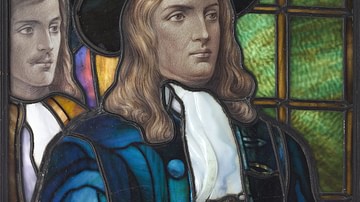Search Articles
Browse Content (p. 65)

Article
William Penn's Holy Experiment
In the 17th century, many groups of British Christians rose and fought against religious intolerance and corruption. The Puritans sought a return to biblical religion and a purified form of Christianity in England. This resulted in the Puritan...

Article
Global Trade in the 13th Century
In the 13th century, astonishing quantities of spices and silk passed from the Far East to Europe. Exact amounts are not known, but spice popularity in both cuisine and medicine reached its historical peak during the Middle Ages in Europe...

Article
Ten Protestant Reformation Facts You Need to Know
The Protestant Reformation (1517-1648) was one of the most significant cultural, political, and religious events in the history of Europe and helped shape the modern world. It was a complex event spanning over 100 years, which radically changed...

Article
The Paris Impressionist Exhibitions, 1874-86
The impressionist exhibitions in Paris through the final quarter of the 19th century were organised by a group of avant-garde artists who struggled to have their innovative works accepted by the art establishment. Although ridiculed by many...

Article
Legions of Late Antiquity
The Roman army underwent dramatic changes in Late Antiquity. Civil war and external conflicts led to the creation of new legions while existing legions were either split or disbanded. Although there was an increase in the number of legions...

Article
The Siege of Jerusalem in 70 CE
The Siege of Jerusalem in 70 CE was the high watermark in the First Jewish-Roman War (66-73 CE) regarding the tension between the two forces. With the Roman Empire transitioning from the Julio-Claudian emperors to the Flavian dynasty in the...

Article
The Divinity of Jesus
In the decades of the 20s and 30s of the 1st century CE, a Jew from the town of Nazareth in the Galilee began preaching that the God of Israel would soon intervene in history, restoring that nation to God's original plan and glory. From this...

Article
Scripture, Faith, the Sacraments, and the Holy Spirit in Calvin’s Institutes
The Protestant Reformation was a period of religious history marked by a great defining, debating, and divergence on what it meant to be an orthodox, faithful Christian. To this end, many theologians offered their own explanations of the...

Article
Chola Art & Architecture
Like many great civilisations, the origins of the Chola, a Tamil Hindu dynasty in southern India, are shrouded in the temporal mists of uncertainty and obscurity. It is however known that they were influential from at least the 3rd century...

Article
Legions of Mesopotamia, Cappadocia, & Arabia
As the Roman Empire expanded further eastward, annexing territories that were once the domain of the Parthians, the legions of Mesopotamia, Cappadocia, and Arabia were called upon to safeguard these newly acquired territories. Mesopotamia...